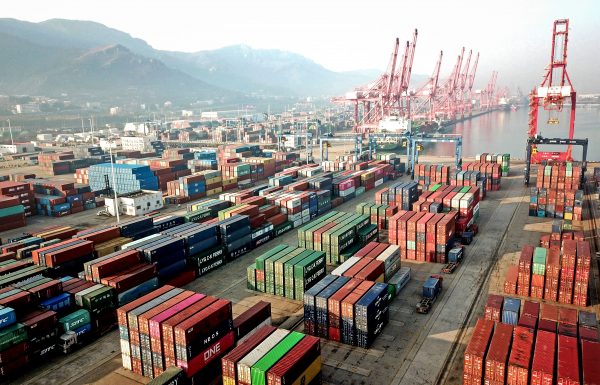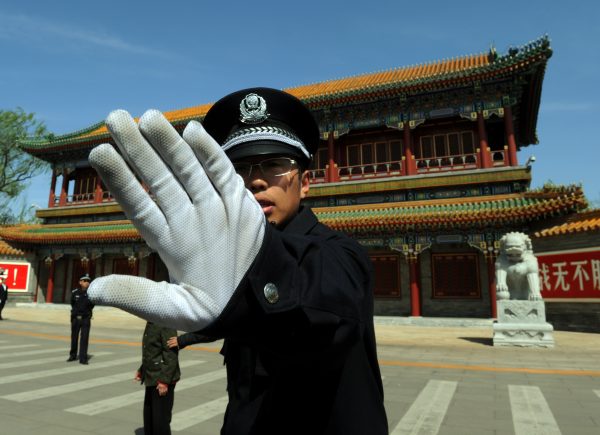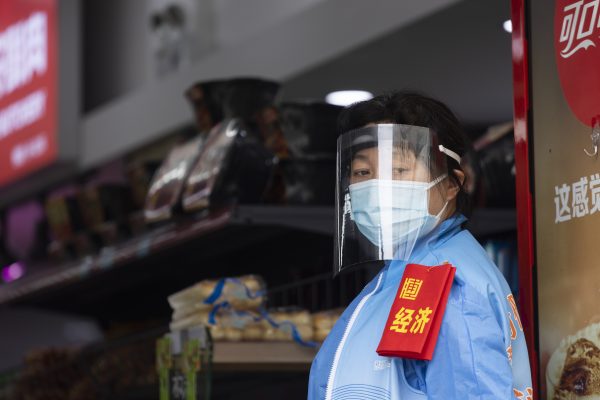Commentary
Once known as “the world’s factory” and widely believed to be the superpower of the near future, China is now experiencing prolonged economic hardship, social instability, and isolation on the global stage. Trade with the West and foreign investment have fallen rapidly, and China’s private businesses are downsizing or going bankrupt following the pandemic-era slump from which the country never truly recovered.
In late March, state-run mouthpiece Xinhua ran a four-part commentary series to promote “the continuous, stable, and healthy development of China-U.S. relations,” focusing on People’s Republic of China (PRC) leader Xi Jinping’s March 27 statements made to representatives from American business, strategic, and academic circles in Beijing.
But even as the Xinhua commentaries argued that the PRC economy remained “a fertile ground for multinational corporations from the U.S. to promote global innovation,” and held out hope that the two countries would “mutually achieve success in their respective development,” the actual trend of past years point to the divide between Communist China and the rest of the world only growing only wider.
- People’s Daily Hastily Deletes 2016 Article Predicting China Would Become a ‘High-income’ Country by 2024
- Fear in the Forbidden City
- In Rare Admission, Xi Jinping Says China’s Economy Is Struggling
The deepening rift can be laid almost entirely at the feet of the Chinese Communist Party (CCP). In doubling down on its political control and Marxist ideology, the CCP has not only stifled the economic momentum of the massive Chinese nation, but also scared off foreign business partners with threatening anti-espionage laws, and discredited Beijing-friendly officials in the West through its alarming moves towards Taiwan and near-thorough destruction of Hong Kong’s autonomy.
Success
You are now signed up for our newsletter
Success
Check your email to complete sign up
As the narrative of “China’s peaceful rise” is replaced by growing awareness of the CCP’s brutal human rights abuses and hegemonic designs, Beijing’s tyranny is having an immediate effect on the PRC’s economic fortunes and its future prospects. China stands to become poorer and weaker, and the Party will face ever greater challenges as it struggles to maintain its rule.
Declining engagement
Prior to the Trump administration, U.S. political and business elites tended to see China as more of a partner than a strategic or ideological threat, despite the CCP’s growing crackdowns on Chinese civil society and religious communities, ethnic minorities, and widespread overseas espionage.
The 2018 U.S.-China trade war and a shift by the administration to recognize Communist China as a security and strategic threat to the U.S. and its allies has led to a snowballing foreign policy offensive. Lawmakers in America and other countries condemned Beijing’s human rights abuses, theft of industrial and military secrets, and its belligerence against Taiwan, which the CCP claims as part of the People’s Republic. The Biden administration has placed increasing restrictions on the ability of Chinese companies to buy high-tech equipment necessary for the development of advanced electronics and artificial intelligence research.

A Feb. 12 article by The Economist, in analyzing an array of data such as the number of international flights going to and from China, academic exchanges, investment flows, and foreign trade, described the country as “overshadowed by a profoundly changing relationship with the West, a more security-driven style of policymaking at home.”
In 2023, China saw 62 million fewer foreign visitors than in 2019, the year before the novel coronavirus outbreak in Wuhan. The Economist noted that while in February 2019, there were 1213 direct flights scheduled from mainland China to the United States, that number had fallen by over four times to just 269 in February 2024.
Looking at greenfield investment — that is, investment money that is intended to set up new ventures in a given country — in China and other markets, The Economist found a sharp drop since 2018. While over $100 billion in such investments were made that year, the number fell to under $60 billion in 2019 and under $20 billion by 2022.
- US ‘Tech War’ Heaps Pressure on Xi and the CCP
- Where Do Unemployed Chinese Go? The Answer Is in the Library
Meanwhile, greenfield investments in India, Vietnam, and Mexico have grown rapidly since 2020, more or less canceling out the reduction of investments into the PRC.
Contrary to the claims of CCP-run media that China remains a fertile ground for foreign capital, financial investments in China have also recorded net outflows starting in 2021, reaching more than negative $30 billion by 2023.
Perceptions have not been helped by the CCP’s expanding police state. According to an annual survey of its member companies that was released on Feb. 1, the American Chamber of Commerce in China reported that 40 percent believed foreign firms were less welcome in the country than 2022, during the height of the Party’s “zero-COVID” pandemic lockdowns.
The illusion of ‘south-south cooperation’
Despite the decline in most engagement figures, The Economist did observe an absolute increase in China’s foreign trade, which rose by 31 percent since 2019. The total number, however, belies falling trade with the United States and European Union, while including growing exports to and imports from other markets, principally Russia and the global south.
“Although America remains important, “south-south co-operation” is growing fast as a strategic and economic priority,” The Economist writes towards the end of its piece, citing a strategy mentioned by Xi Jinping for the PRC, as part of the “global south,” to pursue in light of worsening relations with the U.S. and its allies.
Beijing hopes to create an “alternative centre of world power—one that pivots around China, with the West at a safe distance,” The Economist writes.
However, it is doubtful that the CCP will be able to make lasting progress with its “south-south” approach.

Unlike the economies of the U.S., EU, or Japan, China has not stepped beyond the manufacturing sector to compete in high-end development — of which the Biden administration’s suffocating tech restrictions on Beijing are a clear reminder. Therefore, what the PRC has to offer other developing countries are mostly cheap products, which those countries themselves are aiming to produce and beat China at.
Moreover, while the U.S. maintains a global alliance at least nominally based on liberal democratic values and a post-World War II rules-based order, Communist China, with its Marxist-Leninist view of history and international relations, is not only ideologically out of line with almost all its foreign partners, but in principle opposed to their political systems and national cultures. For example, while many countries may turn a blind eye to the Communist Party’s persecution of Muslim Uyghurs in Xinjiang, the Party’s actions certainly do not endear it to the hundreds of millions of Muslims on multiple continents where China hopes to implement its “south-south cooperation.”
Not even Russia, with which Beijing professes a “no-limits” strategic partnership, can be counted on as a true ally of the PRC. The Chinese have so far not provided weapons or ammunition to the Russian war effort, something that would give Moscow a significant boost on the Ukrainian battlefield, but almost certainly invite crushing Western sanctions.
Capital destruction and Communist China’s road to impoverishment
China’s most pressing problems, however, lie with the CCP’s economic mismanagement of the country.
Citing the work of Peruvian economist Hernando De Soto, a popular Chinese-language social media personality, “Mr. Sun,” described how the CCP’s insistence on socialist-style policies are leading to the destruction of what allowed China to become wealthy in the first place: its emerging capitalist economy.
According to De Soto, author of the 2001 book The Mystery of Capital, the unique characteristic of capital is its ability to create and transform value. While wealth is required for the creation of capital, wealth alone is insufficient for capitalism to function.
A successful market economy requires clear property rights, a fair legal system, and transparent market regulations. While attempts were made in the 1990s and 2000s to implement these in China, most such efforts were rolled back as the Communist Party stressed its leadership over all sectors of society and the economy.
- In Leaked Recording, Elite Chinese Scholar Laments Crippling Dysfunction of Communist Regime
- ‘Unified National Market’ Push Exposes Steep Challenge of Reforming China’s Economy

As a result, while China made rapid strides building up its manufacturing and construction capacity, the lack of political openness required for a successful developed market economy meant that China proved incapable of competing with democratic countries in high-end development, cultural output, and other sectors.
In a recent video, Mr. Sun, who has more than 350,000 subscribers on YouTube and mainly discusses political and economic affairs, argued that China will “become the poorest of the great powers” as the CCP drives off the last foreign entrepreneurs and suppresses China’s own capital.
Looking at the PRC’s national savings data from the fourth quarter of 2023, Mr. Sun noted the growing share of corporate and household savings, which rose quarter-on-quarter by 10 percent and 13.8 percent, respectively, representing a total figure of over $40 trillion.
The massive — and growing — amounts of wealth locked up in savings suggest that many Chinese, be they individuals or firms, hold considerable assets, yet have no safe avenue for investing this wealth.
An article published by the UK-based Financial Times last December titled “China’s debt isn’t the problem” drew attention to widespread “financial distress costs” plaguing investors in the PRC.

While China’s debt — which comes in at more than $47 trillion as of the end of 2023 — can potentially be restructured, the political and economic policies pursued by the CCP leadership have led to a bad investment environment, with many billions misallocated into excessive property, infrastructure, and manufacturing.
“In order to protect themselves from being forced directly or indirectly to absorb part of the losses” associated with policies decided higher up in the CCP leadership, “a wide range of economic actors — workers, middle-class savers, the wealthy, businesses, exporters, banks, and even local governments — will change their behaviour in ways that undermine growth,” the FT article reads.
“Currently, this mentality has already taken hold, and in the future it will only self-reinforce in a vicious cycle,” Mr. Sun observed.
The greater the financial distress costs compounding in China, the more difficult it will become to restructure debts while rebuilding confidence in the financial system — something the CCP has offered little indication of attempting to do in any case.
“Once it reaches a certain threshold, nobody will be able to shoulder the costs of the debt restructuring, and there will likewise be no one capable of restoring confidence in the markets,” Mr. Sun said.
Under these circumstances, the Chinese economy would completely stop functioning as a capitalist system. With diminishing wealth concentrated in the hands of the Communist Party and its officialdom, ordinary citizens will see their livelihoods and prospects wither. This is already evident with the massive increase of Chinese emigration to other countries, including a colossal rise in the number of Chinese nationals apprehended while attempting to illegally enter the United States via the southern border.













